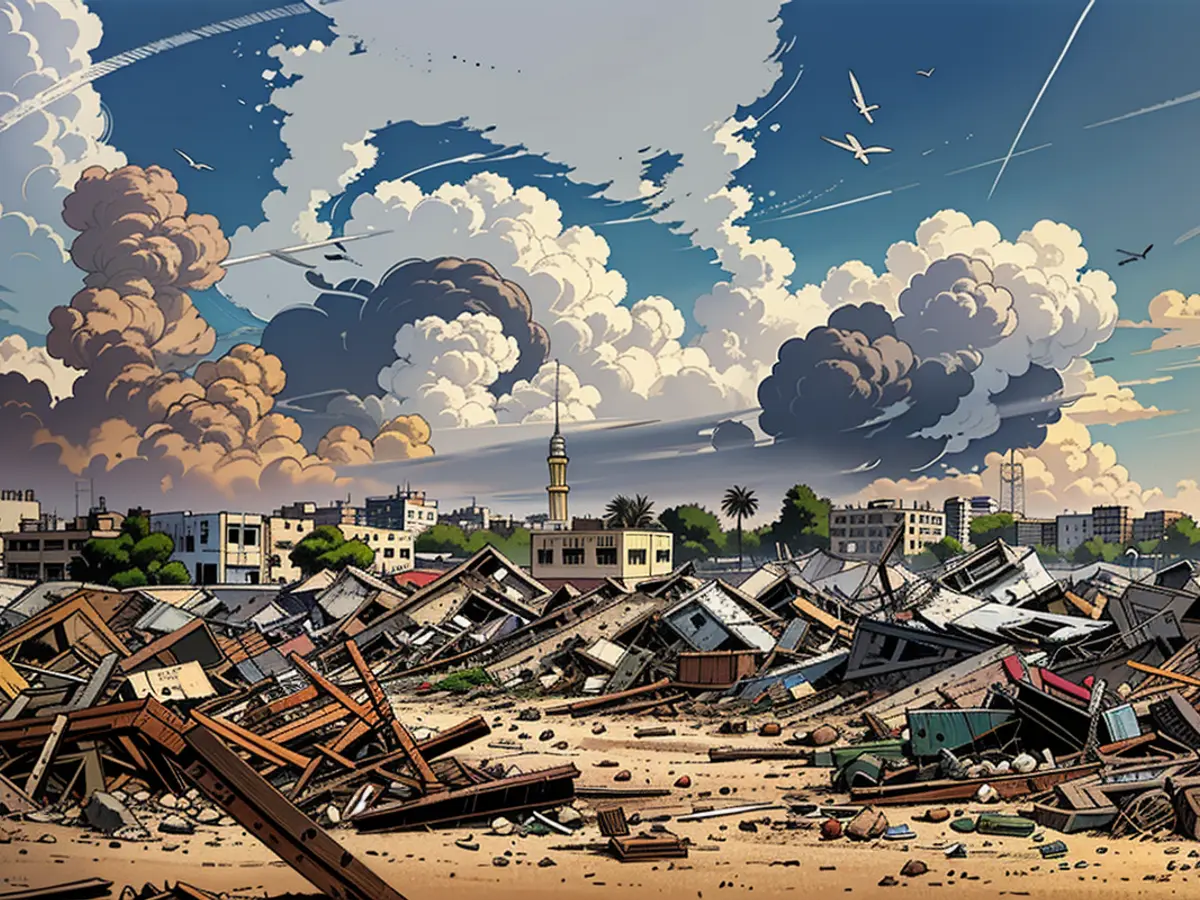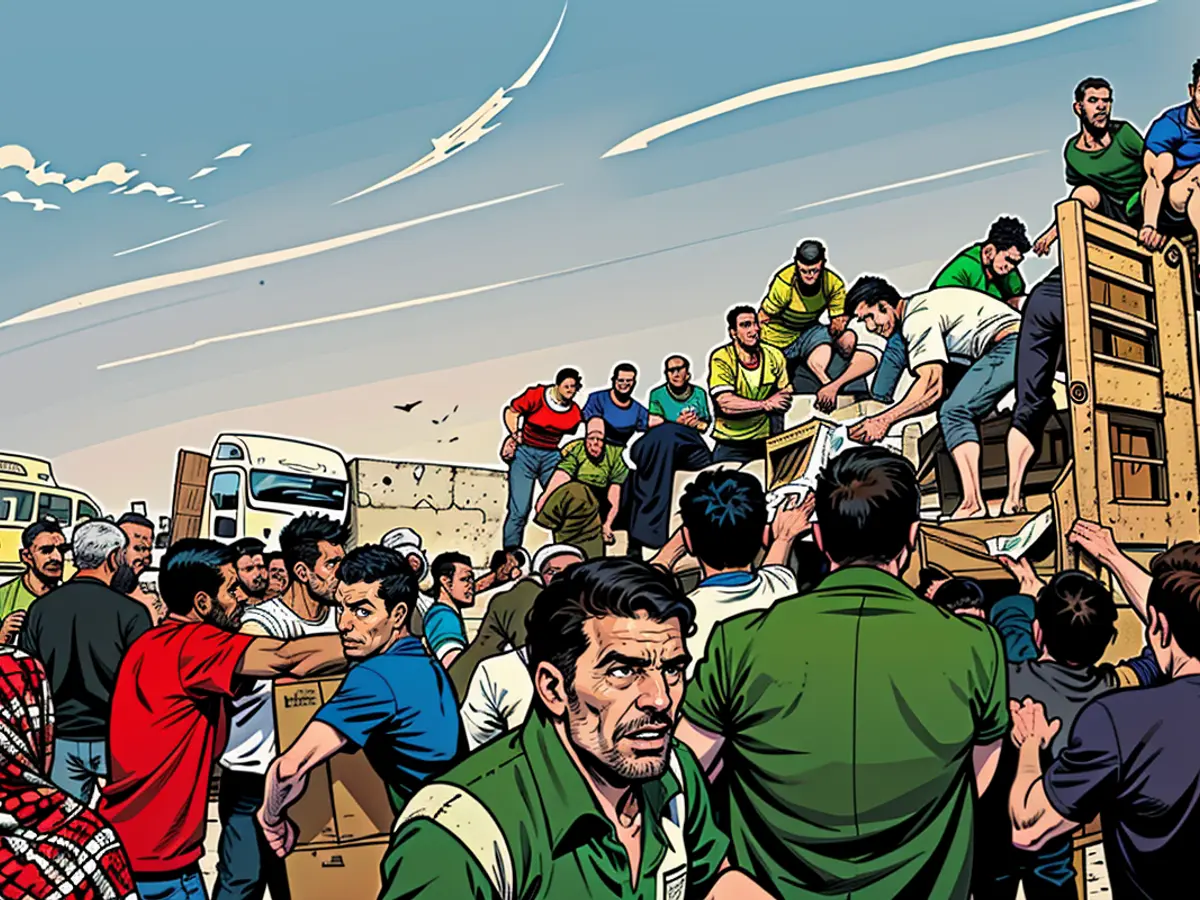In the eighth month of the conflict, this is what the humanitarian crisis in Gaza appears to be.
Families in Gaza, including the father, his wife, and mother, are stuck in a sea of displaced families, dealing with overcrowding and pollution. The Palestinian father spoke to CNN, saying he's been struggling to find aid for his family. They have to drink contaminated water and eat just one meal a day.
"I don't want to talk about food because there is none," he declared on June 5. "Will we die of famine now?
The Israeli military campaign after the October 7 attacks led by Hamas that took around 1,200 lives and captured 250 hostages in southern Israel has left "unspeakable" living conditions for Palestinians in the enclave. Over 75% of the population has been displaced, according to the United Nations Relief and Works Agency (UNRWA). The bombings have destroyed neighborhoods, damaged healthcare infrastructure, and depleted food, water, and fuel supplies.
The Israeli military offensive has led to the deaths of at least 36,654 Palestinians and injured 83,309 more, as per Gaza's Ministry of Health. CNN can't independently verify this information.
Israeli officials claimed that there are no limits on the amount of aid entering Gaza. However, the UN accused Israeli authorities of imposing "illegal restrictions" on relief operations such as land blockages, communication blackouts, and airstrikes. Local staff reported that they are forced to turn away the needy in distribution centers because there's not enough aid to distribute.
Below is a summary of the worsening aid crisis in Gaza after 245 days of war:
Crossing closures almost halt all aid
Israel's restrictions on land routes into Gaza reduced the inflow of aid. However, the crisis worsened when Israeli forces took over the Rafah crossing into Egypt in May, blocking Palestinians from leaving the strip and limiting food supplies.
The UN’s food agency mentioned that their main warehouse in Rafah has been inaccessible since May 9, causing aid distribution to stop for nearly a month now. The agency expressed concerns for southern Palestinians experiencing food shortages, remembering the previous food insecurity in the north after closures of the Rafah crossing. Meanwhile, the US-backed nonprofit World Central Kitchen also stopped operations at its main facility in Rafah and moved to the northern part of the strip.
The $320-million makeshift pier built at the Islamic University campus to serve as a corridor into Gaza took only a few operational weeks before it sustained damage in stormy seas off the Gaza coast. The pier is being repaired but will not be operational for many more weeks at the Israeli port of Ashdod.
The overall quantity of aid entering Gaza has dropped by 67%, according to the UN, to an average of 58 trucks a day, down from the 500 trucks daily before the October 7 attacks.
"Whatever that was in place at the Rafah and Kerem Shalom crossings has now changed," said Louise Wateridge, UNRWA's communications officer. "When these crossings have been interrupted, it's just simply not enough coming from any other sources."
Trucks piling up at the border
Images have surfaced of large relief trucks filled with aid piling up at the border, after Israel increased inspections on aid convoys entering the strip.
COGAT, the Israeli agency that handles aid into Gaza, stated on June 4 that more than 1,000 trucks are waiting to be collected by the UN on the Palestinian side of the Kerem Shalom crossing, accusing the UN of failing to coordinate the intake of the vehicles.

But human rights groups maintain that the "deliberate obstruction at Israeli-controlled crossing points” and increased fighting are hindering aid delivery.
Wateridge told CNN that stalled trucks at Kerem Shalom cannot be received, as intense military action on the Gazan side of the crossing makes it impossible. "It's a complete waste of vital humanitarian aid and a man-made situation."
Difficulties in reaching displaced Palestinians with aid
Even when trucks manage to enter the strip, the damage caused by Israeli strikes to roads and security concerns owing to ongoing hostilities have disrupted humanitarians' attempts to reach the displaced.
According to human rights workers, the few aid trucks that succeed in making it through the crossings face difficulty in reaching their destination. Mahmoud Shalabi, a senior program manager at Medical Aid for Palestinians (MAP), said that they can barely keep up with the demands on the ground, with food and other aid supplies dwindling quickly.
Furthermore, employees from local and international NGOs have reported that they're struggling to reach displaced Palestinians. A coalition of health groups warned that thousands of Palestinians are being denied access to necessary medical aid due to extensive damage to Gaza's healthcare infrastructure.
Aid became increasingly scarce, as UNRWA's food agency reported a "full-blown famine" engulfing the north of Gaza while spreading south. By mid-July, over a million Palestinians, half the territory's population, were expected to face starvation and death, as civilians can't find enough food amid limited supplies and soaring prices.
More than 7,000 children under the age of five developed malnutrition, as per the UN's Office for the Coordination of Humanitarian Affairs.
Humanitarian organizations have been asking for new paths of access, increased truck traffic, less obstruction to the movement of aid workers, and assurances for their security. Israeli assaults on support convoys have received strong criticism from human rights groups, bringing attention to the increasing Western doubt about Israel's battle in Gaza.
Since October 7, the Israeli military has targeted locations of welfare employees in the enclave at least eight times, despite agencies giving their locations so that they could be safeguarded, according to Human Rights Watch (HRW). These assaults "highlight significant problems with the supposed deconfliction system, which is supposed to protect aid workers," the report claimed. CNN had asked the Israeli military for a comment on the HRW report previously.
"It's really dangerous for us humanitarian workers, there are no secure routes, no movement coordination," stated Shalabi.
Shalabi notes that he, his wife, and children have had to escape at least three times since October.
"I'm not hopeful about what's going to happen next," he concluded. "I hope I can return to my home and pick up where I left off in my life before I was displaced."
Read also:
The humanitarian crisis in Gaza has impacted families beyond just food and water, as the father also mentioned the struggle with contaminated water and the lack of meals. This situation is not unique to Gaza, as the Middle East region has seen its fair share of crises that affect millions of people.
Despite Israeli officials claiming no limits on aid entering Gaza, the United Nations and local organizations have accused Israeli authorities of imposing "illegal restrictions" on relief operations, leading to the turning away of needy families at distribution centers. These restrictions have exacerbated the aid crisis in the region, particularly in the Middle East.







